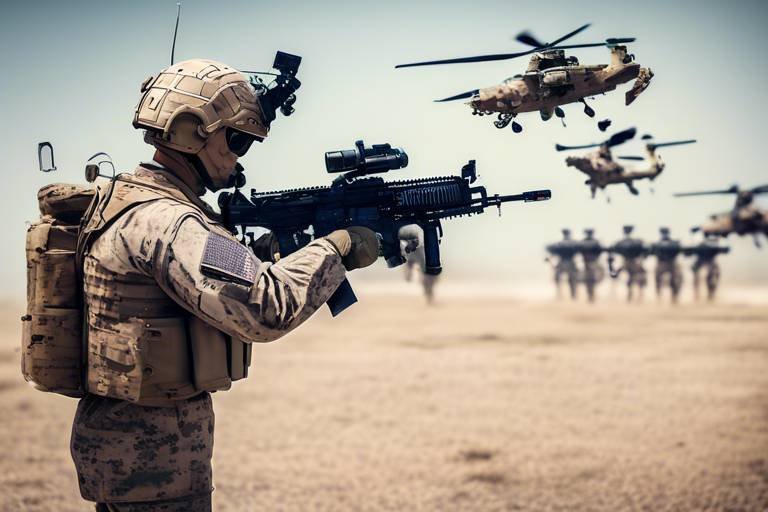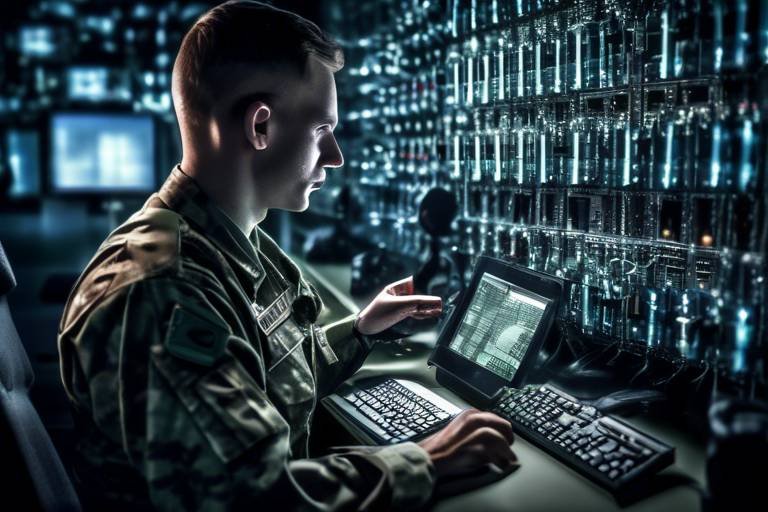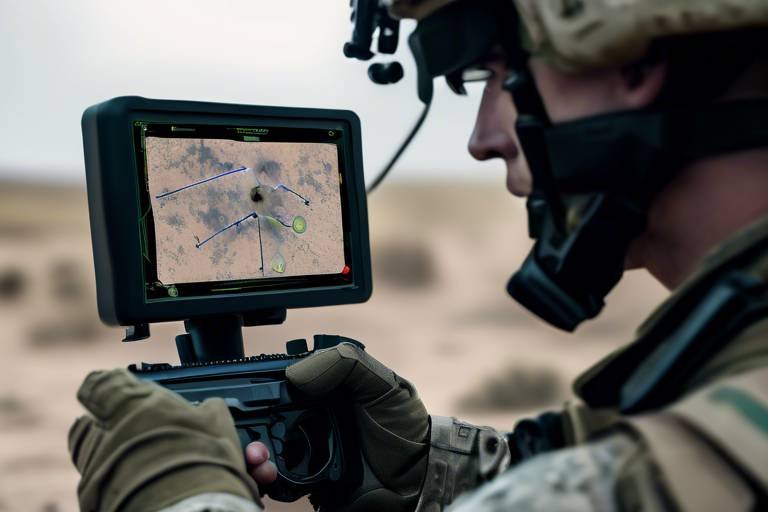How AI is Shaping Military Recruitment Strategies
In today's fast-paced world, the integration of artificial intelligence (AI) into military recruitment is nothing short of revolutionary. Imagine a scenario where the process of selecting the right candidates is not only faster but also more accurate and inclusive. This is the reality that AI brings to the table. By leveraging advanced technologies, military organizations are transforming their recruitment strategies, making them more efficient and effective. But how exactly is AI reshaping this critical aspect of defense operations? Let's dive in!
At its core, AI in military recruitment encompasses a range of technologies that enhance the decision-making process. By integrating data-driven approaches and predictive analytics, military recruiters can streamline candidate assessments like never before. These technologies analyze vast amounts of data, allowing recruiters to identify the best-fit candidates for various roles within the armed forces. It's like having a supercharged assistant that sifts through mountains of information, highlighting the most promising recruits.
One of the most significant advantages of AI is its ability to make data-driven decisions. Military recruiters can now harness the power of data analytics to improve the selection process. By analyzing historical data, AI can identify trends and patterns that reveal what makes a candidate successful in a military role. This not only enhances the quality of hires but also ensures that recruits are more likely to thrive in their positions. Think of it as a crystal ball that gives recruiters insights into future performance based on past data.
With predictive analytics, military recruiters can forecast candidate success by evaluating various metrics. This involves examining past recruitment outcomes and identifying key indicators that lead to effective personnel choices. For instance, AI can analyze factors like educational background, previous experience, and even personality traits to predict how well a candidate might perform in a military environment. This foresight ultimately enhances operational readiness by ensuring that the right individuals are selected for the right roles.
AI tools are also adept at identifying essential competencies required for various military roles. By analyzing job descriptions and performance data, these tools can pinpoint the skills and attributes that are crucial for success in specific positions. This ensures that recruits possess the necessary qualities to serve effectively. It's akin to having a tailored suit—each candidate is matched to the role that fits them best, maximizing their potential.
Another critical advantage of AI in military recruitment is its ability to reduce bias. Traditional recruitment processes can often be influenced by unconscious biases, leading to less diverse candidate pools. However, by utilizing AI algorithms, military recruitment can minimize these biases. Candidates are evaluated based on merit and potential rather than subjective judgments. This not only promotes diversity and inclusion but also enriches the military workforce with a variety of perspectives and experiences.
AI isn't just beneficial for recruiters; it also enhances the candidate experience. AI-driven chatbots and virtual assistants improve communication by providing timely information and support throughout the recruitment process. Imagine having a friendly assistant available 24/7 to answer your questions and guide you through the application process. This level of engagement makes candidates feel valued and informed, ultimately leading to a more positive recruitment experience.
Automation through AI technologies is another game-changer in military recruitment. By streamlining repetitive tasks, such as application sorting and interview scheduling, AI allows human recruiters to focus on what truly matters—strategic decision-making and candidate engagement. This not only improves efficiency but also enhances the overall quality of the recruitment process.
AI systems can efficiently manage applications by sorting and prioritizing candidates based on predefined criteria. This ensures that the most suitable candidates are identified quickly, allowing recruiters to spend less time sifting through applications and more time engaging with top talent. It's like having a personal assistant that knows exactly who to put on your radar.
Interview scheduling can often be a logistical nightmare, but AI tools can automate this process, reducing administrative burdens. By coordinating schedules and sending reminders, AI ensures a smoother experience for both candidates and recruiters. This leads to improved operational efficiency and allows recruiters to focus on building relationships with potential hires rather than getting bogged down in scheduling conflicts.
As AI technologies continue to evolve, their integration into military recruitment will likely expand even further. We're on the brink of a new era where armed forces can attract and select talent in ways that were previously unimaginable. The future of military recruitment is not just about filling positions; it's about finding the right individuals who will contribute to the mission's success. As we embrace these advancements, the potential for a more efficient, inclusive, and effective recruitment process is limitless.
- How does AI reduce bias in military recruitment? AI uses algorithms to evaluate candidates based on data rather than subjective criteria, minimizing human biases.
- What role does predictive analytics play in recruitment? Predictive analytics helps forecast candidate success by analyzing historical data and identifying patterns that lead to effective personnel choices.
- Can AI improve candidate experience? Yes, AI-driven tools enhance communication and provide timely support, making the recruitment process more engaging for candidates.
- What are the benefits of automating recruitment processes? Automation streamlines repetitive tasks, allowing recruiters to focus on strategic decision-making and improving overall efficiency.

Understanding AI in Military Recruitment
In a world where technology is rapidly advancing, artificial intelligence (AI) has emerged as a game changer in various sectors, and military recruitment is no exception. Imagine a recruitment process that is not only faster but also smarter—this is the promise of AI in the armed forces. By leveraging sophisticated algorithms and data analytics, military organizations are transforming how they identify, assess, and select candidates for service. But how exactly does this integration work?
AI technologies are being used to enhance decision-making processes, allowing recruiters to sift through vast amounts of data with unprecedented speed and accuracy. For instance, AI can analyze resumes, social media profiles, and other digital footprints to create a comprehensive profile of potential recruits. This process not only saves time but also ensures that the military can focus on candidates who are truly aligned with their values and requirements.
Moreover, AI-driven systems utilize predictive analytics to forecast the future success of candidates based on historical data. This approach is akin to having a crystal ball that reveals which attributes lead to effective service members. By identifying patterns in past recruitment data, military recruiters can make more informed decisions that enhance operational readiness.
One of the most exciting aspects of AI in military recruitment is its ability to identify key competencies required for various roles. For example, different military positions demand unique skill sets, from technical expertise to leadership qualities. AI tools can analyze the traits of successful personnel in specific roles and ensure that new recruits possess these essential skills. This not only improves the quality of candidates entering the service but also boosts overall team performance.
Furthermore, AI plays a crucial role in reducing bias in recruitment. Traditional hiring processes can sometimes be influenced by human prejudices, which can lead to a lack of diversity and missed opportunities for talented individuals. By utilizing AI algorithms that focus on merit and potential, military organizations can promote a more inclusive environment. This shift not only reflects societal values but also enhances the effectiveness of the armed forces by drawing from a broader talent pool.
In summary, the integration of AI in military recruitment is a multifaceted approach that promises to revolutionize how defense organizations attract and select talent. From enhancing decision-making and reducing bias to identifying key competencies, AI is paving the way for a more efficient and effective recruitment process. As we delve deeper into this topic, it becomes clear that the future of military recruitment is not just about finding candidates—it's about finding the right candidates.
- How does AI improve military recruitment? AI enhances military recruitment by streamlining processes, analyzing data for better decision-making, and reducing biases.
- Can AI completely replace human recruiters? While AI can automate many tasks, human judgment and engagement are still crucial in the recruitment process.
- What types of data does AI analyze in recruitment? AI analyzes various data types, including resumes, social media profiles, and historical recruitment data to assess candidates.
- How does AI reduce bias in recruitment? AI algorithms can be designed to focus on objective criteria, minimizing the influence of human biases in candidate selection.

Data-Driven Decision Making
In today's fast-paced world, the integration of artificial intelligence (AI) into military recruitment has revolutionized how decisions are made. Gone are the days of relying solely on gut feelings or traditional methods; now, military recruiters are harnessing the power of data to make informed choices. Imagine having a crystal ball that not only predicts the future but also helps you understand the past. That’s precisely what AI offers through its ability to analyze vast amounts of data, allowing recruiters to pinpoint the best candidates for various roles.
One of the most significant advantages of data-driven decision-making is the way it enhances the selection process. By utilizing advanced algorithms, recruiters can sift through thousands of applications in a fraction of the time it would take a human. This means that instead of spending hours poring over resumes, recruiters can focus on engaging with the most promising candidates. The result? A more efficient recruitment process that leads to better hiring outcomes.
Furthermore, AI's analytical capabilities enable recruiters to evaluate a candidate's potential based on a multitude of factors, such as educational background, previous experience, and even psychological traits. This comprehensive analysis not only improves the chances of finding the right fit for military roles but also boosts overall operational readiness. After all, having the right people in the right positions can make all the difference in critical situations.
To illustrate the impact of data-driven decision-making in military recruitment, consider the following table that summarizes key benefits:
| Benefit | Description |
|---|---|
| Efficiency | Reduces time spent on manual tasks, allowing recruiters to focus on strategic engagement. |
| Better Fit | Enhances the quality of hires by matching candidates' skills and attributes with job requirements. |
| Informed Decisions | Provides data-backed insights that lead to more accurate assessments of candidates. |
| Operational Readiness | Ensures that the armed forces are staffed with individuals who are well-suited for their roles. |
Moreover, predictive analytics plays a crucial role in this data-driven approach. By analyzing historical data, AI can forecast candidate success rates and identify patterns that lead to effective personnel choices. For instance, if a particular educational background or skill set consistently correlates with high performance in a specific military role, recruiters can prioritize candidates who possess those attributes. This not only streamlines the selection process but also significantly enhances the quality of recruits.
As military organizations continue to embrace AI technologies, the emphasis on data-driven decision-making will only grow stronger. In an era where every second counts, utilizing data to make informed recruitment choices is not just an advantage; it’s a necessity. By implementing these advanced systems, military recruiters are not only improving their processes but also ensuring that they are prepared for the challenges of tomorrow.
- How does AI improve military recruitment? AI enhances recruitment by analyzing data, streamlining processes, and reducing biases, leading to better hires.
- What role does predictive analytics play? Predictive analytics helps forecast candidate success by evaluating historical data and identifying effective patterns.
- Can AI reduce bias in recruitment? Yes, AI algorithms can minimize human biases, promoting diversity and selecting candidates based on merit.
- What are the benefits of data-driven decision-making? Benefits include increased efficiency, better candidate fit, informed decisions, and improved operational readiness.

Predictive Analytics in Recruitment
This article explores the transformative impact of artificial intelligence on military recruitment, highlighting innovative techniques, efficiency improvements, and the future of personnel selection in defense organizations.
An overview of how AI technologies are integrated into military recruitment processes, enhancing decision-making and streamlining candidate assessments through data-driven approaches and predictive analytics.
AI's ability to analyze vast amounts of data allows military recruiters to make informed decisions, improving the selection process and ensuring a better fit for roles within the armed forces.
Predictive analytics is revolutionizing the way military recruiters approach their task. Imagine having the power to foresee which candidates are most likely to succeed in specific roles based on data from past recruits. This isn't just a dream—it's a reality that AI brings to the table. By evaluating historical data and identifying patterns, predictive analytics helps military recruiters forecast candidate success with remarkable accuracy. This capability enhances operational readiness by ensuring that the right individuals are selected for the right roles, ultimately leading to a more effective military force.
For instance, consider a scenario where a military branch is looking to fill positions in technical fields. Using predictive analytics, recruiters can analyze data from previous candidates who excelled in similar roles. They can look at various factors such as educational background, previous experience, and even personality traits that contributed to their success. By identifying these key indicators, recruiters can create a profile of the ideal candidate. This data-driven approach not only streamlines the selection process but also enhances the quality of hires.
Furthermore, predictive analytics can help in identifying potential challenges that candidates might face in training or operational settings. By assessing factors like adaptability, teamwork, and stress management from historical data, recruiters can better prepare candidates for the realities of military life. This proactive approach ensures that recruits are not only a good fit on paper but are also likely to thrive in the demanding environment of the armed forces.
Here's a quick overview of how predictive analytics works in military recruitment:
| Step | Description |
|---|---|
| Data Collection | Gathering historical data on past recruits, including performance metrics and personal attributes. |
| Data Analysis | Utilizing algorithms to identify trends and patterns that correlate with successful outcomes. |
| Candidate Profiling | Creating profiles of ideal candidates based on the analysis to guide recruitment efforts. |
| Ongoing Evaluation | Continuously updating the model with new data to refine predictions and improve future recruitment strategies. |
As military organizations embrace these advanced analytics, they not only enhance their recruitment processes but also contribute to a more capable and prepared force. The implications of predictive analytics in recruitment are profound, paving the way for a future where data-driven decisions lead to superior outcomes in military personnel selection.
AI-driven chatbots and virtual assistants improve communication with candidates, providing timely information and support throughout the recruitment process, thus enhancing the overall experience.
Automation through AI technologies streamlines repetitive tasks in military recruitment, allowing human recruiters to focus on strategic decision-making and candidate engagement, ultimately improving efficiency.
AI systems can efficiently manage applications, sorting and prioritizing candidates based on predefined criteria, ensuring that the most suitable candidates are identified quickly.
AI tools can automate interview scheduling, reducing administrative burdens and ensuring a smoother process for both candidates and recruiters, leading to improved operational efficiency.
As AI technologies continue to evolve, their integration into military recruitment will likely expand, shaping future strategies and redefining how armed forces attract and select talent.
- What is predictive analytics in military recruitment?
Predictive analytics involves using historical data to forecast which candidates are likely to succeed in military roles, enhancing the selection process. - How does AI reduce bias in recruitment?
AI algorithms can analyze candidates based on merit and potential, minimizing human biases that may affect hiring decisions. - What are the benefits of automating recruitment processes?
Automation streamlines repetitive tasks, allowing recruiters to focus on engaging with candidates and making strategic decisions. - Will AI replace human recruiters?
While AI will enhance recruitment processes, human judgment and interpersonal skills will remain essential in selecting the right candidates.

Identifying Key Competencies
This article explores the transformative impact of artificial intelligence on military recruitment, highlighting innovative techniques, efficiency improvements, and the future of personnel selection in defense organizations.
An overview of how AI technologies are integrated into military recruitment processes, enhancing decision-making and streamlining candidate assessments through data-driven approaches and predictive analytics.
AI's ability to analyze vast amounts of data allows military recruiters to make informed decisions, improving the selection process and ensuring a better fit for roles within the armed forces.
Predictive analytics helps military recruiters forecast candidate success by evaluating historical data and identifying patterns that lead to effective personnel choices, ultimately enhancing operational readiness.
In the realm of military recruitment, identifying key competencies is crucial for ensuring that recruits are not just filling positions, but are also equipped with the necessary skills and attributes to thrive in their roles. AI technologies play a significant role in this process by analyzing various data points, including past performance metrics, psychological assessments, and even situational judgment tests.
By leveraging machine learning algorithms, military recruiters can pinpoint the essential competencies required for different roles. For instance, a combat role may demand strong leadership abilities, resilience, and physical fitness, while intelligence roles might prioritize analytical thinking, attention to detail, and technical proficiency. AI can sift through historical data to determine which traits have been associated with success in these roles, thus creating a more tailored selection process.
Moreover, AI tools can assess soft skills, which are often harder to quantify. By analyzing communication patterns, teamwork dynamics, and problem-solving approaches in candidates, AI can help recruiters gauge how well a potential recruit might fit into the existing military culture. This not only enhances the quality of hires but also fosters a more cohesive and effective team environment.
To illustrate how AI identifies these competencies, consider the following table that outlines some of the key competencies for various military roles:
| Military Role | Key Competencies |
|---|---|
| Combat Soldier | Leadership, Physical Fitness, Decision-Making Under Pressure |
| Intelligence Analyst | Analytical Thinking, Attention to Detail, Technical Proficiency |
| Logistics Coordinator | Organizational Skills, Problem-Solving, Communication |
| Cybersecurity Specialist | Technical Skills, Critical Thinking, Adaptability |
This data-driven approach not only streamlines the recruitment process but also ensures that the military is equipped with personnel who possess the right mix of skills and attributes. As we move forward, the integration of AI in identifying key competencies will play a pivotal role in building a more capable and diverse armed forces.
AI-driven chatbots and virtual assistants improve communication with candidates, providing timely information and support throughout the recruitment process, thus enhancing the overall experience.
Automation through AI technologies streamlines repetitive tasks in military recruitment, allowing human recruiters to focus on strategic decision-making and candidate engagement, ultimately improving efficiency.
AI systems can efficiently manage applications, sorting and prioritizing candidates based on predefined criteria, ensuring that the most suitable candidates are identified quickly.
AI tools can automate interview scheduling, reducing administrative burdens and ensuring a smoother process for both candidates and recruiters, leading to improved operational efficiency.
As AI technologies continue to evolve, their integration into military recruitment will likely expand, shaping future strategies and redefining how armed forces attract and select talent.
- How does AI improve military recruitment?
AI enhances military recruitment by streamlining processes, reducing biases, and identifying key competencies in candidates. - What are key competencies in military roles?
Key competencies vary by role but generally include skills like leadership, analytical thinking, and physical fitness. - Can AI reduce bias in recruitment?
Yes, AI can minimize human biases by focusing on data-driven assessments rather than subjective judgments. - How does predictive analytics work in recruitment?
Predictive analytics evaluates historical data to forecast candidate success and identify patterns that lead to effective personnel choices.

Reducing Bias in Recruitment
In today's world, where diversity and inclusion are paramount, the military is taking significant steps to ensure that recruitment processes are fair and equitable. One of the most promising developments in this area is the use of artificial intelligence (AI) to reduce bias in recruitment. Traditional recruitment methods often suffer from unconscious biases, which can lead to the exclusion of qualified candidates based on factors such as gender, race, or socioeconomic background. However, AI has the potential to revolutionize this aspect of military recruitment.
AI algorithms can be designed to focus solely on merit and potential, rather than personal characteristics that are irrelevant to job performance. By analyzing vast amounts of data, AI can identify the skills and experiences that are most predictive of success in various military roles. This data-driven approach not only streamlines the selection process but also promotes a more diverse candidate pool.
One of the key advantages of using AI in recruitment is its ability to eliminate human biases from the decision-making process. For instance, AI systems can be programmed to ignore demographic information such as names or addresses, which can often lead to biased judgments. Instead, these systems evaluate candidates based on their qualifications, experiences, and competencies. This shift towards a more objective evaluation method can significantly enhance the fairness of the recruitment process.
Moreover, AI can continuously learn and adapt its algorithms based on new data and outcomes. This means that if a particular hiring pattern is found to be biased, the AI can be recalibrated to address this issue. By actively monitoring recruitment outcomes, military organizations can ensure that their processes remain equitable and effective over time.
To illustrate the impact of AI on reducing bias, consider the following table, which compares traditional recruitment methods with AI-enhanced approaches:
| Aspect | Traditional Recruitment | AI-Enhanced Recruitment |
|---|---|---|
| Decision-Making | Human judgment can be biased | Data-driven, objective analysis |
| Candidate Evaluation | Subjective assessments | Focus on skills and competencies |
| Diversity | Often lacks representation | Promotes a diverse candidate pool |
| Adaptability | Static processes | Dynamic, learns from outcomes |
In conclusion, the integration of AI into military recruitment represents a significant step toward reducing bias and promoting fairness. By leveraging technology to focus on what truly matters—skills and potential—military organizations can build a more diverse and capable force. As AI continues to evolve, its role in ensuring equitable recruitment practices will undoubtedly grow, paving the way for a more inclusive future in the armed forces.
- How does AI reduce bias in military recruitment? AI reduces bias by focusing on data-driven assessments rather than personal characteristics, thereby promoting merit-based selection.
- Can AI completely eliminate bias? While AI can significantly reduce bias, it is important to continuously monitor and adjust algorithms to ensure fairness.
- What are the benefits of using AI in recruitment? Benefits include improved efficiency, enhanced candidate experience, and a more diverse talent pool.
- How does AI learn to improve recruitment processes? AI systems can learn from new data and outcomes, allowing them to adapt and refine their algorithms over time.

Enhancing Candidate Experience
In today's fast-paced world, candidate experience is more critical than ever, especially in military recruitment. Imagine you're a potential recruit, excited about the prospect of serving your country, but feeling overwhelmed by the application process. This is where artificial intelligence (AI) steps in to transform that experience into something seamless and engaging. AI-driven tools, such as chatbots and virtual assistants, are revolutionizing how candidates interact with military recruiters, providing real-time support and information.
One of the most significant advantages of using AI in recruitment is the timeliness of communication. Gone are the days of waiting weeks for a response. With AI, candidates can receive instant answers to their inquiries, whether it’s about application status, recruitment events, or eligibility criteria. This not only keeps candidates informed but also helps build a sense of trust and transparency between them and the military organization.
Furthermore, AI can personalize the recruitment journey for each candidate. By analyzing data from previous interactions, AI systems can tailor responses and provide relevant information based on individual needs. For instance, if a candidate has shown interest in a specific military role, the AI can offer insights into that position, including required skills and training programs. This level of personalization enhances the overall experience, making candidates feel valued and understood.
Additionally, AI tools can gather feedback from candidates during the recruitment process. By utilizing brief surveys or prompts, military recruiters can assess how candidates feel about their experience. This feedback loop is essential for continuous improvement, allowing organizations to make data-driven adjustments that enhance the recruitment process further. After all, a satisfied candidate is more likely to become a committed recruit.
Moreover, the use of AI can significantly reduce the anxiety often associated with recruitment. Candidates frequently experience uncertainty about what to expect during the process. With AI providing clear guidance and support, candidates can navigate the recruitment landscape with confidence. This not only improves their experience but also reflects positively on the military’s image as a modern and approachable organization.
In conclusion, enhancing candidate experience through AI is not just about efficiency; it's about creating a recruitment process that resonates with the values of today’s society. By prioritizing communication, personalization, and feedback, military organizations can ensure that every candidate feels respected and engaged. As technology continues to evolve, the potential for AI to further enrich the candidate experience is limitless, positioning military recruitment as a leader in innovative hiring practices.
- How does AI improve candidate communication in military recruitment?
AI tools like chatbots provide instant responses to candidates' queries, ensuring timely communication and reducing uncertainty. - Can AI personalize the recruitment experience?
Yes, AI can analyze individual candidate data to offer tailored information and support based on their interests and needs. - What role does feedback play in enhancing candidate experience?
Feedback collected through AI tools helps military organizations understand candidates' experiences and make necessary improvements. - How does AI help reduce anxiety for candidates?
By providing clear guidance and support, AI helps candidates navigate the recruitment process confidently, reducing feelings of uncertainty.

Automation of Recruitment Processes
In the fast-paced world of military recruitment, automation is becoming a game-changer. Imagine a scenario where tedious tasks are handled by intelligent systems, freeing up human recruiters to focus on what truly matters: connecting with candidates and making strategic decisions. This is not just a dream; it’s a reality that is unfolding thanks to the integration of artificial intelligence (AI) into recruitment processes.
One of the most significant advantages of automation is its ability to streamline application management. Traditional recruitment methods often involve sifting through countless resumes, a process that can be both time-consuming and prone to error. However, with AI systems in place, applications can be sorted and prioritized based on predefined criteria. This means that the most suitable candidates are identified quickly and efficiently, allowing recruiters to spend their time on more impactful activities.
Moreover, AI tools can automate the scheduling of interviews. Picture this: instead of back-and-forth emails trying to find a suitable time for both the candidate and the recruiter, an AI-powered system can handle all of that. It can access calendars, suggest optimal times, and even send reminders. This not only reduces the administrative burden on human recruiters but also enhances the candidate experience by making the process smoother and more efficient.
But the benefits of automation don’t stop there. AI can also assist in the initial screening of candidates. By analyzing resumes and application forms, AI can identify key qualifications and competencies that match the military's needs. This helps to ensure that only the most relevant candidates move forward in the recruitment process, saving time and resources.
Furthermore, the implementation of AI-driven automation can lead to a more consistent and fair selection process. By relying on data and algorithms, military organizations can reduce the risk of human error and bias, ensuring that every candidate is evaluated based on their merits. This is crucial in promoting diversity and inclusion within the armed forces, as it allows for a more equitable assessment of all applicants.
As we look to the future, the role of automation in military recruitment is only expected to grow. The combination of AI and automation not only enhances the efficiency of recruitment processes but also improves the overall experience for candidates. When candidates feel valued and respected throughout the recruitment journey, it reflects positively on the military as a whole, attracting top talent who are eager to serve.
- How does automation improve the recruitment process?
Automation enhances efficiency by handling repetitive tasks, allowing human recruiters to focus on strategic decision-making and candidate engagement. - Can AI reduce bias in military recruitment?
Yes, AI algorithms can help minimize human biases by evaluating candidates based on data and predefined criteria. - What role does predictive analytics play in military recruitment?
Predictive analytics helps forecast candidate success by analyzing historical data and identifying patterns that lead to effective personnel choices. - How can AI enhance the candidate experience?
AI-driven chatbots and virtual assistants provide timely information and support, improving communication with candidates throughout the recruitment process.

Streamlining Application Management
In the fast-paced world of military recruitment, efficiency is key, and AI technologies are stepping up to the plate like never before. Imagine a scenario where hundreds, if not thousands, of applications flood in for a limited number of positions. It can be overwhelming, right? Well, this is where AI comes in to revolutionize the application management process. By leveraging advanced algorithms and machine learning, military recruiters can now sort through applications with remarkable speed and precision.
AI systems are designed to analyze resumes and applications based on predefined criteria, such as educational background, skills, and experience. This means that instead of spending countless hours sifting through paperwork, recruiters can focus their energy on the most promising candidates. With AI, the recruitment process becomes not just faster, but also more accurate. For example, AI can identify specific keywords that align with military roles, ensuring that candidates who meet the essential qualifications are prioritized.
Furthermore, the integration of AI in application management helps to maintain a high standard of quality in candidate selection. By utilizing data-driven insights, recruiters can track patterns and trends in successful applicants, which can inform future recruitment strategies. This process isn't just about filling positions; it's about finding the right fit for the armed forces. As a result, AI not only enhances the efficiency of application management but also improves the overall quality of recruits.
To illustrate the impact of AI on application management, consider the following table that compares traditional recruitment methods with AI-driven processes:
| Aspect | Traditional Methods | AI-Driven Methods |
|---|---|---|
| Time to Review Applications | Days to Weeks | Hours to Days |
| Candidate Sorting | Manual Review | Automated Filtering |
| Bias in Selection | High | Minimized |
| Focus on Strategic Tasks | Limited | Enhanced |
As shown in the table, the differences are striking. With AI, the military can streamline application management processes, allowing recruiters to dedicate more time to engaging with candidates and making informed decisions. This shift not only enhances operational efficiency but also fosters a more inclusive and diverse recruitment landscape.
In conclusion, the future of military recruitment is bright, and AI is leading the charge in streamlining application management. As technology continues to advance, we can expect even greater improvements that will not only benefit the armed forces but also ensure that the best candidates are selected for service.
- How does AI improve the recruitment process? AI enhances the recruitment process by automating repetitive tasks, analyzing vast amounts of data, and minimizing biases, which leads to better candidate selection.
- Can AI completely replace human recruiters? While AI can streamline many aspects of recruitment, human judgment and interaction remain essential for building relationships and understanding candidate potential.
- Is the use of AI in recruitment ethical? When implemented correctly, AI can promote fairness and reduce biases, making recruitment more equitable. However, it is crucial to monitor AI systems to ensure ethical standards are maintained.
- What are the future trends in military recruitment? Future trends may include greater reliance on AI technologies, enhanced data analytics for decision-making, and more personalized candidate experiences through AI-driven tools.

Interview Scheduling and Coordination
In the fast-paced world of military recruitment, can often feel like a logistical nightmare. With numerous candidates vying for a limited number of positions, ensuring that everyone gets a fair shot while managing the time and resources of the recruiting team is crucial. This is where artificial intelligence (AI) steps in as a game-changer.
AI tools can automate the scheduling process, effectively removing the tedious back-and-forth communication that often bogs down human recruiters. Imagine a scenario where a recruiter spends hours trying to find a suitable time for interviews, only to face conflicting schedules. With AI, this hassle is minimized. The technology can analyze the availability of both candidates and interviewers in real-time, suggesting optimal times for interviews with just a few clicks. This not only saves time but also enhances the overall experience for candidates, who appreciate the streamlined communication.
Additionally, AI can send automated reminders to candidates, ensuring they don’t miss their interviews. This feature reduces the number of no-shows, which can be frustrating for recruiters who have invested time and resources into the selection process. Moreover, by keeping candidates informed, AI fosters a sense of professionalism and respect for their time, which can significantly enhance the military's image as an employer.
To further illustrate the impact of AI in interview scheduling, consider the following table that compares traditional methods with AI-driven approaches:
| Aspect | Traditional Method | AI-Driven Method |
|---|---|---|
| Time Spent Scheduling | Hours of back-and-forth communication | Minutes to confirm schedules |
| No-Show Rate | High due to lack of reminders | Reduced with automated reminders |
| Candidate Experience | Frustrating and disorganized | Smooth and professional |
Moreover, AI can assist in coordinating interviews across multiple locations, which is especially beneficial for military branches that recruit nationwide or even globally. By leveraging cloud-based scheduling tools, military recruiters can conduct interviews via video conferencing, making it easier for candidates to participate regardless of their geographical location. This not only widens the talent pool but also demonstrates the military's commitment to innovation and adaptability.
In conclusion, the integration of AI in interview scheduling and coordination is revolutionizing military recruitment. By automating mundane tasks, recruiters can focus on what truly matters—finding the best candidates for the armed forces. The efficiency gained through AI not only streamlines the process but also enhances the candidate experience, ultimately leading to a more effective recruitment strategy.
- How does AI improve the recruitment process?
AI improves the recruitment process by automating repetitive tasks, analyzing candidate data, and enhancing communication, allowing recruiters to focus on strategic decision-making. - Can AI reduce bias in military recruitment?
Yes, AI can help reduce bias by using data-driven algorithms that evaluate candidates based on their skills and competencies rather than subjective human judgments. - What role does predictive analytics play in recruitment?
Predictive analytics helps recruiters forecast candidate success by analyzing historical data and identifying patterns that correlate with effective personnel choices. - How does AI enhance the candidate experience?
AI enhances the candidate experience by providing timely communication, automated scheduling, and personalized support throughout the recruitment process.

The Future of Military Recruitment with AI
As we look ahead, the integration of artificial intelligence into military recruitment processes is set to revolutionize how armed forces attract and select talent. Imagine a world where the recruitment experience is not only seamless but also tailored to the unique needs of each candidate. With AI technologies advancing at an unprecedented pace, the military is embracing these innovations to enhance its recruitment strategies.
One of the most exciting prospects is the potential for hyper-personalization in recruitment. AI can analyze individual candidate profiles, preferences, and career aspirations, allowing military recruiters to create customized pathways for each applicant. This means that instead of a one-size-fits-all approach, candidates can receive tailored information about roles that align with their skills and interests. It’s like having a personal guide through the recruitment maze!
Moreover, as AI continues to evolve, we can expect a significant shift towards virtual reality (VR) and augmented reality (AR)
In addition to enhancing the candidate experience, AI will play a pivotal role in data analytics. With the capability to analyze vast amounts of information, AI can identify trends and patterns that human recruiters might overlook. This data-driven approach will enable military organizations to refine their recruitment strategies continuously, ensuring they attract the right talent for the right roles. It’s like having a crystal ball that predicts the future of military readiness! Furthermore, the emphasis on diversity and inclusion will be significantly bolstered by AI technologies. By implementing algorithms designed to reduce bias, military recruiters can ensure a fairer selection process that values merit and potential over preconceived notions. This shift not only promotes a more equitable recruitment landscape but also enriches the armed forces with diverse perspectives and skills, ultimately enhancing operational effectiveness. As we embrace these changes, it's crucial to recognize that the future of military recruitment with AI is not just about technology; it's about human connection. While AI can streamline processes and enhance decision-making, the human touch remains irreplaceable. Recruiters will still play a vital role in engaging with candidates, understanding their motivations, and fostering a supportive environment. The synergy between AI and human recruiters will create a dynamic recruitment landscape that is both efficient and empathetic. In conclusion, the future of military recruitment with AI is a thrilling prospect that promises to transform how armed forces operate. As technology continues to advance, we can anticipate a recruitment process that is more efficient, inclusive, and engaging. The military is not just looking for candidates; it’s on a mission to find the right fit for the future of defense. Are you ready to see how this unfolds? AI is revolutionizing military recruitment by streamlining processes and enhancing decision-making. By leveraging data-driven approaches, military recruiters can assess candidates more effectively, ensuring a better fit for various roles within the armed forces. Predictive analytics enables military recruiters to forecast candidate success by analyzing historical data. This helps identify patterns that lead to effective personnel choices, ultimately enhancing operational readiness and effectiveness. Absolutely! AI algorithms can minimize human biases in recruitment, promoting diversity and inclusion. By focusing on candidates' merits and potential rather than subjective factors, military organizations can build a more equitable selection process. AI-driven chatbots and virtual assistants provide timely information and support to candidates throughout the recruitment process. This not only improves communication but also creates a more engaging and user-friendly experience for applicants. AI technologies automate repetitive tasks such as application management and interview scheduling. This allows human recruiters to focus on strategic decision-making and candidate engagement, significantly improving overall efficiency. The future of military recruitment is likely to see an expanded integration of AI technologies. As these tools evolve, they will continue to shape strategies for attracting and selecting talent, redefining how armed forces operate in recruitment.
AI enhances efficiency by automating repetitive tasks, analyzing candidate data, and personalizing the recruitment experience.
Data analytics will help identify trends and patterns, allowing recruiters to make informed decisions and refine strategies continuously.
Yes, AI algorithms can minimize human biases, promoting diversity and inclusion by focusing on merit and potential.
Absolutely! While AI will streamline processes, the human touch is essential for engaging with candidates and understanding their motivations.Frequently Asked Questions



















